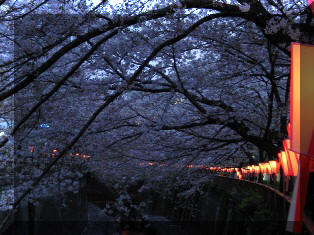

J-Pop Exchange Exclusive Interview with Kokia
Kokia
J-Pop Exchange Radio Show Exclusive Interview
Transcript
OAD: 11/7/2009
SeanBird (JPop Exchange):
Hi Kokia, thank you for taking the time
to speak with us; you
have been a professional musician for about 10 years now.
How did you get started?
Kokia: Well my debut was quite sensational. My friend brought (my) demo to a record company and on the same day, I met people from the record company. Next day, they took me to a recording studio— everything happened at once and I felt like I was not prepared for it.
SeanBird: Going a bit further back in
time now, can you tell us something more about your early life
experiences and the importance of music early in your life?
Kokia: I was born and raised in Tokyo. My grandparents loved art and music and I was always surrounded by entertainment since I was little. Naturally I started playing piano and making songs.
SeanBird: I gather that music
has been the main focus of your education as well?
Please, tell us about your musical training.
Kokia: I went to schools for classical music; both high school and college and majored in vocal Everyday was about music. But one day I realized what I wanted to do is not study. I wanted to tell message through my music.
SeanBird: I understand that
Arigatou, which was published in 1999, was the first song that you
fully wrote and composed yourself.
Is that right?
Can you tell us something about your inspiration for the song and
how it came about?
Kokia: Yes. I wrote lyrics and music for this song. And this was the first song released to the public so this song is special to me. Actually this is the song my friend brought to the record company as demo. I wrote this when my dog passed away. I had him for 15 years so I was heartbroken; but I put the message of “thank you”. So I wrote this “Arigatou”; it means thank you.
SeanBird: Can you give us some
insight into your writing process?
Kokia: Well, my image is… it either comes from my mind or somewhere in the universe, I don’t know. Anyways, somewhere I can’t see. I don’t think too much when writing music. But, if I don’t feel like it, I can’t write anything I want to. It’s more like waiting for a message itself. Even if I don’t wait for the timing, I can manage making something okay, kind of song. But of course, that kind of music is not really exciting. Anyway, I try to wait for the timing of something coming up to me.
SeanBird: Who are your musical
influences and what music do you listen to?
Kokia: Actually, I don’t really listen to music. Why? I don’t know. I feel more from vigil or smell than listening to sound. So, I watch a lot of movies. When I was little, I used to like American music of 80’s.
SeanBird: Near the end of last
year, our radio listeners had the chance to hear your rendition of
Leonard Cohen’s song, Hallelujah.
You did a wonderful job with that song.
Would you say Leonard Cohen is an influence and / or a
favorite of yours? . . . that song was on your recently released
album: Christmas Gift.
Our listeners’ were also treated to your exquisite Christmas
Medley from that album, and that certainly helped to add to the joy
of the season for us.
Kokia: Well, thank you; I’m glad to hear that. Leonard Cohen’s “Hallelujah” is something I heard when I was little, and very much shocked. I thought it was the most beautiful melody in the world. This melody has been in the bottom of my heart since then. I am really glad I had a chance to cover this song.
SeanBird: Speaking of that
album, around Christmas 2008, you traveled to New York City to give
away 1000’s of copies of your Christmas album.
You have referred to this as your “Music Gift” project and I
believe it has a connection to 9/11.
Can tell us more about the project; why it is important to
you, and what you were hoping to accomplish through it.
Kokia: Well, we have to be careful when talking about this project. When I sent message through music, there’s no political meaning. For example, event like 9/11 and any tragedy happening in the World. What I want to tell through songs is something that reaches to individual’s hearts. 7 years ago, I found out about 9/11 on Japanese TV news. On that night, I felt many people’s grief and shout from my heart; and I wrote a song called “Remember The Kiss”. Anyway, just like lyrics of this song says: “Our lips are meant to sing a song of love; and cry out the babies are all the same.” As a musician, I mainly perform in Japan and I want to make contribution as much as I can in where I am and when I can with believing the power of the music. “Music Gift Project” is one of them and with cooperation from many people; I was able to give away 10,000 CD’s. I hope people who received the CD listen with their family and friends, hopefully feel something in their heart and think about love and peace a little bit. I hope.
SeanBird: I really appreciate
your message that music is a universal language that can transcend
all kinds of differences including linguistic, cultural and
political differences.
What was the outcome of your “Music Gift” project?
Kokia: Well I don’t know about the outcome. But I have received words of gratitude and joy.
SeanBird: Another recent project of yours has been your contributions to the anime Gunslinger Girl. I believe you wrote and performed two songs for that series—would you mind sharing with us what working on that project was like for you?
Kokia: My songs can be two types: one is my own musical work and the other is something I make according to the image of animation or TV commercial. “Gunslinger Girl” is the later one. So I tried to make it much to the animation; but I think it was done pretty good.
SeanBird: In addition to your
success in Japan, you have successfully reached out to other
countries, for example China and France.
Tell us something about these projects and experiences
overseas.
Kokia: Performing in overseas was always my dream. I am having concerts in Europe for a few years. But I want more people to get to know my music.
SeanBird: Would you ever
consider touring in the USA?
Kokia: Well, there’s no reason to say no. If I’m given such an opportunity, of course!
SeanBird: How can fans contact
you to learn more about your music and any current or upcoming
projects?
Kokia: Well, for now, my official website is only in Japanese, so you could check some website my fans are making in English. Online distribution is about to start in America, or maybe already started.
SeanBird: In conclusion, is
there anything you’d like to talk about / mention that we haven’t
discussed thus far?
Kokia: Well, I really want everyone to see my stage (performance) once. It would be wonderful if there is any opportunity. Thank you all very much for having some interest in my music. Please remember there is a Japanese musician name Kokia, K-O-K-I-A, Kokia from Japan, wishing I would be able to see you someday. Bye! Thank you for listening.